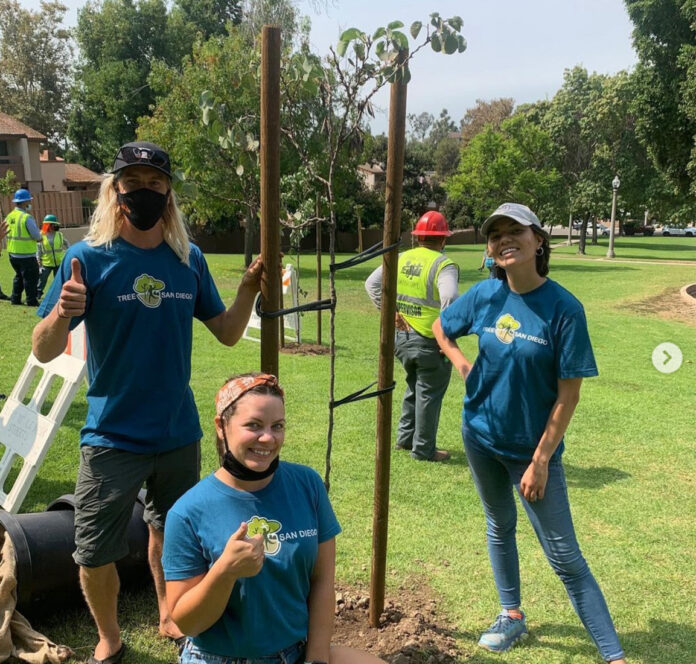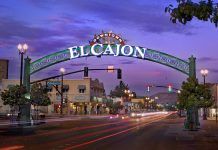Tree San Diego is a nonprofit organization dedicated to increasing the quality and density of San Diego’s urban forest. However, the approach they take varies across the county, and partnerships with East County municipalities like La Mesa look different than projects in South San Diego neighborhoods like Chula Vista.
Tree San Diego Director Elektra Fike-Data described their work as collaborative “with local and state government agencies, nonprofits, community organizations and businesses to plant the right trees in the right places with the right care” including disadvantaged communities.
“Cities like San Diego and La Mesa have received CalFire and CCI funding in the past and Tree San Diego has supported their projects as a subcontractor helping to expand their tree planting proposals, review their tree palette selections, and identify planting zones for new trees,” Fike-Data said.
One of their programs, Branch Out San Diego uses photogrammetry, interactive tree plotter mapping software, and citizen-focused forestry training to multiply the benefit of trees, primarily working with CalFire on urban and community forestry projects.
“Tree San Diego is working with local partner, FireWatch, to bring photogrammetry solutions to wildfire mitigation planning and plant-back strategies. Through these projects and partnerships, we’re able to collaborate with local tribal communities to evaluate canopy assessments, change detection, and forest health in wildfire prone areas,” Fike-Data said.
Photogrammetry involves generating thermal maps from multiple images to check for hotspots that indicate potential wildfires and the path they might take.
Other Initiatives like their Trejuvenation project diverts trees that have reached the end of their life away from being chipped up or disposed into landfills and toward being utilized in products like lumber, furniture, musical instruments, biopolymer and biochar, a soil enhancer.
In South County, the organization’s Tree Advantage project focuses on increasing the tree canopy in communities the CalEnviroScreen 2.0 tool ranks as being on or past the 75% disadvantaged community ranking. That ranking is based on environmental, health, and socioeconomic information and scores for every census tract in the state— an area with a high score is one that experiences a much higher pollution burden than areas with low scores and the scores are mapped so that different communities can be compared.
Environmental factors like auto body shops located near National City homes were specifically mentioned in the 2018 CalEnviroScreen as negative factors but increasing the tree canopy, the area shaded by trees can reduce volatile organic compounds and improve air quality while also reducing urban heat.
The Branch Out San Diego project is also slated to plant over 1575 trees in disadvantaged-ranked communities and throughout tribal reservations with partner support. The organization works with partners like National City’s Mundo Gardens to expand outreach efforts and climate change awareness.
“Our team is dedicated to providing urban forestry training and educational materials in multiple languages and also works with partners such as Mundo Gardens and Indigenous Regeneration, a San Diego county nonprofit that takes a regenerative approach to food cultivation, medicinal farming and other programs to achieve re-indigenization in Native communities.
The group shifted much of the training they once held in person to an online format taught by International Society of Arboriculture-certified arborists; holding training sessions online actually increased engagement, Fike-Data said.
Although many of the large planting events they typically hold were postponed during the COVID-19 pandemic, they have held mini-plantings in city parks throughout La Mesa and other San Diego county neighborhoods as well as outdoor classroom trainings for students in some communities.
“We hope to bring back in-person Tree Steward training and hands-on planting demos in spring of 2022,” Fike-Data said.
Visit treesandiego.org for more information on Tree San Diego’s programs.














